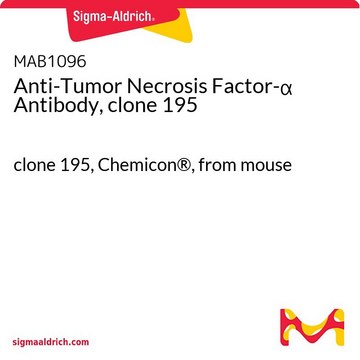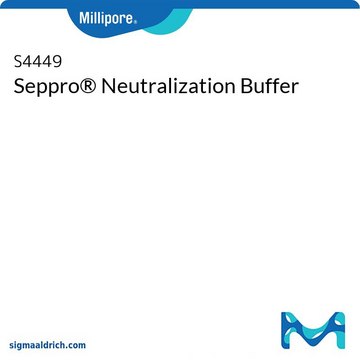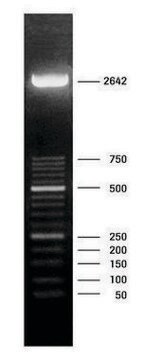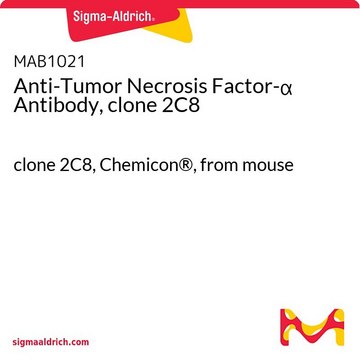T3198
Monoclonal Anti-Tumor Necrosis Factor-α antibody produced in mouse
clone 45418.111, purified immunoglobulin, lyophilized powder
Sinónimos:
Anti-TNF-α
About This Item
Productos recomendados
biological source
mouse
Quality Level
conjugate
unconjugated
antibody form
purified immunoglobulin
antibody product type
primary antibodies
clone
45418.111, monoclonal
form
lyophilized powder
species reactivity
rat
technique(s)
capture ELISA: suitable
neutralization: suitable
western blot: 1-2 μg/mL
isotype
IgG1
UniProt accession no.
storage temp.
−20°C
target post-translational modification
unmodified
Gene Information
rat ... Tnf(24835)
General description
Immunogen
Application
Biochem/physiol Actions
Tumor necrosis factor-α (TNFα) affects various cellular processes such as blood-brain barrier, inflammatory, thrombogenic and vascular changes following brain damage. TNFα expression is upregulated in various central nervous system disorders, including Alzheimer′s disease, multiple sclerosis, Parkinson′s disease, meningococcal meningitis and human immunodeficiency virus (HIV) infection. Elevated expression of TNFα in the brain and blood in response to lipopolysaccharide might increase brain stem thrombosis, hemorrhage and stroke sensitivity/risk in hypertensive rats. Tumor necrosis factor-α activates polymorphonuclear leukocyte NADPH oxidase, thereby facilitates development of systemic oxidative stress (OS), inflammation and hypertension in rats.
Physical form
Disclaimer
¿No encuentra el producto adecuado?
Pruebe nuestro Herramienta de selección de productos.
Storage Class
11 - Combustible Solids
wgk_germany
WGK 3
flash_point_f
Not applicable
flash_point_c
Not applicable
ppe
Eyeshields, Gloves, type N95 (US)
Certificados de análisis (COA)
Busque Certificados de análisis (COA) introduciendo el número de lote del producto. Los números de lote se encuentran en la etiqueta del producto después de las palabras «Lot» o «Batch»
¿Ya tiene este producto?
Encuentre la documentación para los productos que ha comprado recientemente en la Biblioteca de documentos.
Nuestro equipo de científicos tiene experiencia en todas las áreas de investigación: Ciencias de la vida, Ciencia de los materiales, Síntesis química, Cromatografía, Analítica y muchas otras.
Póngase en contacto con el Servicio técnico








